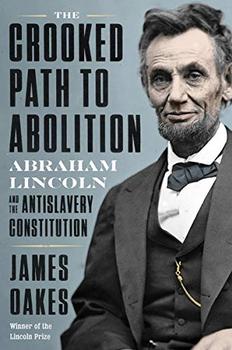
Critics' Opinion:
Readers' rating:
Published Jan 2021
288 pages
Genre: History, Current Affairs and Religion
Publication Information
An award-winning scholar uncovers the guiding principles of Lincoln's antislavery strategies.
The long and turning path to the abolition of American slavery has often been attributed to the equivocations and inconsistencies of antislavery leaders, including Lincoln himself. But James Oakes's brilliant history of Lincoln's antislavery strategies reveals a striking consistency and commitment extending over many years. The linchpin of antislavery for Lincoln was the Constitution of the United States.
Lincoln adopted the antislavery view that the Constitution made freedom the rule in the United States, slavery the exception. Where federal power prevailed, so did freedom. Where state power prevailed, that state determined the status of slavery, and the federal government could not interfere. It would take state action to achieve the final abolition of American slavery. With this understanding, Lincoln and his antislavery allies used every tool available to undermine the institution. Wherever the Constitution empowered direct federal action―in the western territories, in the District of Columbia, over the slave trade―they intervened. As a congressman in 1849 Lincoln sponsored a bill to abolish slavery in Washington, DC. He reentered politics in 1854 to oppose what he considered the unconstitutional opening of the territories to slavery by the Kansas–Nebraska Act. He attempted to persuade states to abolish slavery by supporting gradual abolition with compensation for slaveholders and the colonization of free Blacks abroad.
President Lincoln took full advantage of the antislavery options opened by the Civil War. Enslaved people who escaped to Union lines were declared free. The Emancipation Proclamation, a military order of the president, undermined slavery across the South. It led to abolition by six slave states, which then joined the coalition to affect what Lincoln called the "King's cure": state ratification of the constitutional amendment that in 1865 finally abolished slavery.
"A superb analysis of how the Constitution influenced the battle over slavery...Oakes persuasively shows how, from the moment Lincoln assumed office, he made it clear by both rhetoric and action that slavery was doomed. Many books discuss Lincoln and abolition, but this is among the best." - Kirkus Reviews (starred review)
"Oakes's well researched narrative offers a vivid and insightful contribution to the literature on the abolition of slavery and Lincoln's role." - Library Journal (starred review)
"[A] crisp and well-argued examination of the politics and constitutional theories behind President Lincoln's stance on slavery...This intelligent and deeply researched study adds much to the scholarly debate about how and why slavery was abolished." - Publishers Weekly
"With this superb book, Oakes opens the way for a thorough retelling of the nation's history from the American Revolution to the Civil War." - Sean Wilentz, author of No Property in Man
"Eleanor Roosevelt used to say, 'If you must compromise, compromise up.' The champion compromiser up was Lincoln, as Oakes proves, avoiding the simple views of him as just opportunist or just emancipator. He knew where he was going, even when he had to obscure the goal." - Garry Wills, author of Lincoln at Gettysburg
"A diamond of historical scholarship, with deep research and understanding shining brilliantly in every facet." - Sidney Blumenthal, author of The Political Life of Abraham Lincoln
"With crisp and lucid prose, Oakes provides a map that guides the reader through the zigs and zags of the path to freedom." - James M. McPherson, author of Battle Cry of Freedom
This information about The Crooked Path to Abolition was first featured
in "The BookBrowse Review" - BookBrowse's membership magazine, and in our weekly "Publishing This Week" newsletter. Publication information is for the USA, and (unless stated otherwise) represents the first print edition. The reviews are necessarily limited to those that were available to us ahead of publication. If you are the publisher or author and feel that they do not properly reflect the range of media opinion now available, send us a message with the mainstream reviews that you would like to see added.
Any "Author Information" displayed below reflects the author's biography at the time this particular book was published.
James Oakes is one of our foremost Civil War historians and a two-time winner of the Lincoln Prize for his works on the politics of abolition. He teaches at the Graduate Center of the City University of New York.





The Flower Sisters
by Michelle Collins Anderson
From the new Fannie Flagg of the Ozarks, a richly-woven story of family, forgiveness, and reinvention.

The House on Biscayne Bay
by Chanel Cleeton
As death stalks a gothic mansion in Miami, the lives of two women intertwine as the past and present collide.

The Funeral Cryer by Wenyan Lu
Debut novelist Wenyan Lu brings us this witty yet profound story about one woman's midlife reawakening in contemporary rural China.
Your guide toexceptional books
BookBrowse seeks out and recommends the best in contemporary fiction and nonfiction—books that not only engage and entertain but also deepen our understanding of ourselves and the world around us.